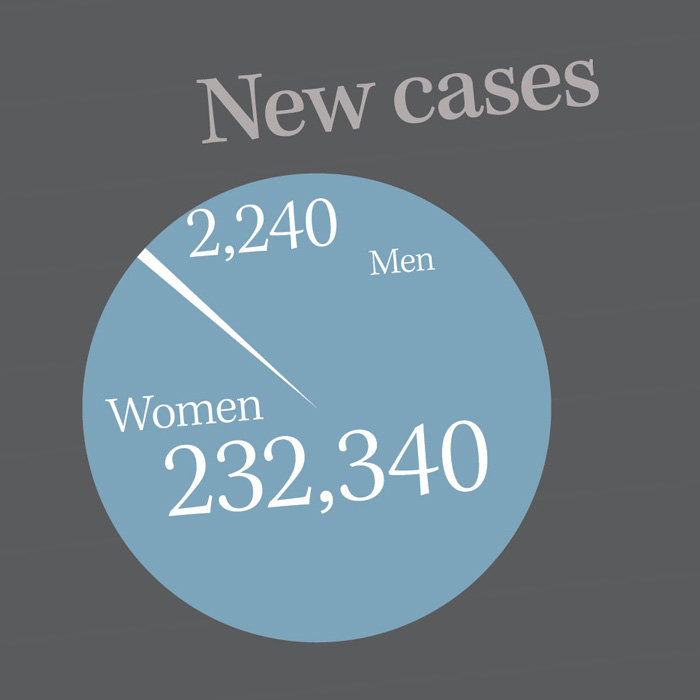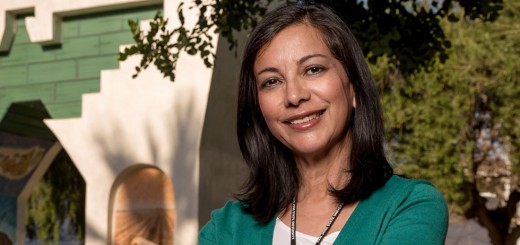A breast cancer education
“At 1 p.m. on March 16, 2009, when I was only 38 years old, I received a phone call from my oncologist,” wrote alumna Mary Koskovich in December 2011. “What the doctor told me altered my life in ways that went far beyond my ability to express it in words. She said, ‘Oh Mary, it’s not good. The breast cancer is in almost every one of the bones in your body. I am very sorry.’”
Metastatic breast cancer is cancer that has spread beyond the tumor in the breast into other parts of the body. Also known as MBC, stage IV or advanced breast cancer, metastatic breast cancer is not the same as recurrent breast cancer, which means cancer has returned to the same part of the same breast after treatment. A cancerous tumor in the breast does not kill a person. It is the metastasis—the spread of cancerous cells to vital organs—that kills. And it kills with what Koskovich termed a “potent lethalness.”
An avid rock climber, mountain biker, runner, paramedic, teacher and student, she described herself at the time as “healthy” and “vivacious.” Koskovich was in the middle of a master’s program in applied anthropology at San Jose State, and working full-time as faculty member and director of the paramedic program at Foothill College and co-director of Stanford School of Medicine International EMS Education. Her prognosis: between one and five years with standard Western treatment; 11 months without it.
“Right from the start she distinguished herself,” says Chuck Darrah, chair of the anthropology department. “Everybody really liked and respected her.” For her thesis work, Koskovich was planning to go to India and Nepal—an area she had previously visited to establish the area’s first pre-hospital emergency response agencies and schools—to study international emergency medical services education and implementation. After her diagnosis, it became clear that South Asia was no longer an option, but she was dedicated to earning her degree.
“We asked ourselves, what is she doing this for?” says Darrah. “If she wants to do this, we have to find a way to let her do it.” Together with a group of other anthropology faculty members, Darrah and Professor Jan English-Lueck, associate dean of social science and Koskovich’s master’s project chair, brainstormed alternative ways Koskovich could fulfill her degree requirements.
The answer seemed clear. Koskovich would be immersed in the world of cancer for the foreseeable future, reconstructing the framework of her life and turning her medical knowledge inward. Anthropology is the study of humanity, of our society, culture, development and identity and of how we live. And few things are as central to how we live as how we deal with disease and dying.
“Stories on film are more compelling than anything [anthropologists] could write with 10 times as many words,” says Darrah. The faculty members broached the idea of making the project a documentary—and having Koskovich not only lead the research but go on camera as a subject in her own study. More comfortable behind the scenes, Koskovich reluctantly agreed to be in the film, turning an anthropologist’s eye on her own experiences.
“I really wanted to finish it, and they found a way to help me finish it,” she said, wryly. “Even if it was to torture me by making a documentary.”
Beyond Pink
The documentary is called The Breast Cancer Journey: Beyond Pink. It became a collaboration between Koskovich and two other anthropology master’s candidates, each with her own goals and final project reports. Jessica Donohue, a visual anthropologist with a focus on health education, joined the project as producer and director. And Cassandra Carruth planned to examine the role of nurses in the clinical experience of cancer patients. Koskovich’s role was that of primary interviewer, with the intention to examine coping strategies of those with terminal breast cancer diagnoses.
In spring 2011, two years after Koskovich was diagnosed terminal, the project officially commenced. In the meantime, Koskovich had tackled a climb of Yosemite’s El Capitan and married her sweetheart, Jack Hoeflich, planning her wedding at the same time that she planned her end of life celebration. In lieu of wedding gifts, they requested donations to fund the documentary. Additional support was gathered through San Jose State and through the crowd-funding site IndieGoGo.
“Mary was our gatekeeper to the community,” says Donohue. “She was the center of the project.” In September, Koskovich began seeking other women and men with metastatic breast cancer who would be willing to discuss their breast cancer journey on camera. As gatekeeper, she reached out to support groups, online dialog chambers, churches and senior centers. A recruitment flyer was posted in chat rooms, websites, health center walls and even in grocery stores. Her efforts resulted in three other participants willing and able to be interviewed at CreaTV studios in downtown San Jose: Janet Sollod, Michelle Moskalik and Lydia Mackovitch.
Through the experiences of these women, the film explores loss, cancer terminology, coping strategies and, as the title implies, the Pink Movement. The research team dubbed metastatic cancer the “orphan of the breast cancer movement” because the vast majority of breast cancer information and the clear focus of the widely commercialized Pink Movement are on prevention and care for primary breast cancer. It does not address the needs of terminal patients. The ultimate aim of the documentary—and the primary reason for choosing the medium of film rather than a traditional research paper—was to create an education tool that could be disseminated to raise awareness of the unique experience of those living with, as Koskovich put it, an “expiration date.”
While each of the women express appreciation for the positive aspects of the Pink Movement—creating awareness and fundraising—each of them take serious issue with the movement’s commercialization, operation and marketing strategy. Its focus on prevention and a cure is isolating to those who have not prevented cancer and cannot be cured.

In 2013, an estimated 234,580 new cases of invasive breast cancer will be diagnosed. Of those cases, 2,240 will be men. An estimated 39,620 women and 410 men will die of breast cancer in 2013. —The American Cancer Society
In keeping with her “no nonsense” persona, as characterized by Darrah, Koskovich’s feelings toward the Pink Movement come across strong in both the documentary and her notes. From the widely publicized misappropriation of funds within the movement to the alienation of men with breast cancer by pushing pink, Koskovich called her position toward the movement an “active hatred.”
“When I see all these beautiful bald women [on billboards], it’s hard for me to believe that they have breast cancer,” she said on the film. “And they’re all happy about it, too. The last time I checked that wasn’t the happiest thing to have on the planet. I think it’s a lie. The other problem I have with the Pink Movement message is it blames the victim: ‘If you detect it early, you might be able to live.’ Because what if I didn’t detect it early? Mine was detected early but it still came back.”
Completion
Koskovich was awarded her master’s degree in applied anthropology on January 25, 2012, a few weeks after submitting her completed project report. She was in the hospital when her husband called Darrah: “get here now,” he told him. In a matter of hours, Darrah was at Koskovich’s bedside to present her with her degree.

From the first appearance of metastasis, the average survival of women with metastatic breast cancer is between two and three and a half years. Twenty-five to 35 percent of women live for five years. Ten percent pass the ten-year mark. Between one and two percent of women are cured. —California Breast Cancer Research Program (2004)
“Mary was so thrilled,” says English-Lueck.
She died the next day.
“Watching a student go through that and pass away,” says English-Lueck, pausing to compose herself. “It was transformative.”
The documentary was finished in the spring, and on April 9 it first aired on CreaTV. After a private family screening and a faculty/student screening, The Breast Cancer Journey: Beyond Pink was distributed across a number of organizations that interact with the metastatic breast cancer community, from hospice centers to academic institutions. Donohue built a website called TerminallyPink.org to make the documentary permanently available for free streaming to the general public. Carruth, who is still in her master’s program at San Jose State, is currently working on the final part of the project: sharing the documentary far and wide. This will bring to fruition Koskovich’s ultimate goal of giving the metastatic breast cancer community a voice.
“Whatever she was doing, she wanted to be doing some good,” says Darrah. “With this film she has done something that’s not just a testimony to an individual. It allows a group of individuals to transcend themselves and make something to raise awareness.”
“Mary knew she was going to die from cancer, but she didn’t know when,” says her husband, Jack Hoeflich. “If she had known it was only days down the road I think she still would have worked on the project. The project gave her something positive to think about. She could hope that her experience may help someone cope. She could share knowledge and experience. Mary was amazingly empathetic.”
“If you get a death sentence and you start doing everything differently, it raises the question of why you’re living your life the way you are,” says Darrah. For Koskovich, there was no question. She was truly doing what she wanted to be doing in life—pushing limits and helping others.





I knew Mary for many years. Watched her go through amazing transformations on life. Sadly we lost touch after I quit working at Foothill. The above story sounds just like the rock solid Mary I knew. The world is truly a lesser place without her. Rest in peace my old friend. May your outstanding work live on forever and keep helping others.
Thanks for reading and commenting, all! We appreciate your interest and feedback.
Thank you, Mary. I hope Jessica & Cassandra have carried on Mary’s vision just the way she wanted. I also hope Mary’s widow, Jack Hoeflich, has done his best to get Mary’s message is out there, as well
Really amazing story.
Great article Alli. Very touching. What a brave woman.